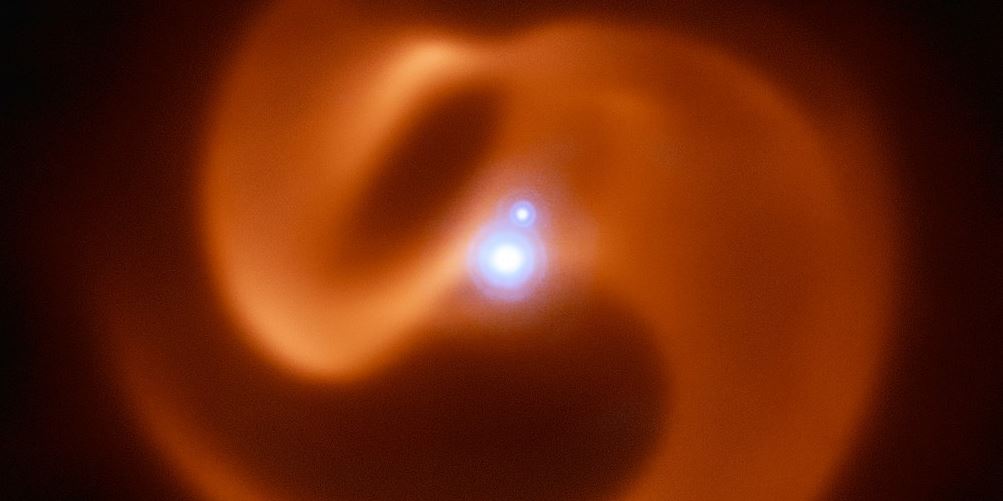
Rare star system discovered in our galaxy
Recommended for Middle Grades
Hey there, young stargazers! Guess what? Astronomers have made an incredible discovery in our very own Milky Way galaxy! They found something super rare—a star system that’s like no other. And guess what else? It’s going to explode someday! But don’t worry, we’ll tell you all about it in a fun and comical way!
So, this star system is called a Wolf-Rayet star system, which is a fancy name for something super special. These systems are so rare that they make astronomers go, “Wow!” Only one out of every hundred million stars is gigantic enough to become a Wolf-Rayet. That’s like finding a diamond in a haystack!
This star system, named ‘Apep’ after the ancient Egyptian god of chaos, is located about 8,000 light-years away from our cozy planet Earth. And you know what’s even crazier? Apep is even more unusual than other Wolf-Rayet systems! Why? Because it has not just one, but two stars! Yep, two suns hanging out together, having a celestial party
Dazzling Dance: Apep’s Supernova!
- Now, imagine these two stars dancing around each other, twirling and spinning. They complete one full orbit every 125 Earth years! That’s longer than you’ve been alive, and longer than anyone’s been playing video games. But here’s the coolest part—when these stars whirl, they release massive amounts of carbon dust. And this dust creates a dazzling tail that looks like something out of a fairytale! Picture a dusky, glowing tail trailing behind them as they dance across the galaxy.
- Oh, and did we mention how big these stars are? They make our Sun look like a tiny speck of dust. Each star is about 10 to 15 times larger than our Sun. They’re so bright and hot that they’ll make you forget about summer barbecues. In fact, they’re more than 100,000 times brighter and hotter than our sunny buddy up there.
- But here’s the twist in this cosmic tale: as much as we’d love for this star system to stick around forever, it won’t. Like a grand finale, these two stars will eventually explode in a fantastic event called a supernova. Boom! And you know what happens after that? They transform into black holes, the mysterious giants of space. It’s like the grandest magic trick ever, where the stars disappear into darkness.
- To learn more about this incredible discovery, astronomers used a super-powerful telescope called the European Southern Observatory’s Very Large Telescope in Chile. They pointed it towards the sky, capturing every twinkle and sparkle of this extraordinary star system. They’re still unraveling the secrets of Apep and its breathtaking dance in the heavens.
- So, dear young astronomers, keep dreaming big and looking up at the stars. You never know what wonders await us in this vast and wacky universe!
Watch a video
Behold the mesmerizing animation showcasing the enchanting dance of this extraordinary star system as it gracefully orbits itself.
Curious Times is a leading newspaper and website for kids. We publish daily global news aligned to your learning levels (also as per NEP 2020): Foundational, Preparatory (Primary), Middle and Senior. So, check out the News tab for this. We bring kids’ favourite Curious Times Weekly newspaper every weekend with top news, feature stories and kids’ contributions. Also, check out daily JokesPoke, Tongue Twisters, Word of the Day and Quote of the Day, kids need it all the time.
Curious Times News Program for Schools for FREE. Over 5,000 schools and teachers from all over the world have joined our programme so that students and teachers can get FREE Educative Newspaper. Here, kids can take part in world events and win prizes and certificates for free through their schools.
Moreover, schools are sharing important School News, like interviews with the principal, notices about new students, contests, and results, not just on social media but also on a news website for kids and other schools.
Thus, do not wait any further, sign-up for your school for FREE.
The following social media platforms allow you to communicate with us: WhatsApp, Instagram, Facebook, Youtube, Twitter, and LinkedIn.
0 (Please login to give a Curious Clap to your friend.)
